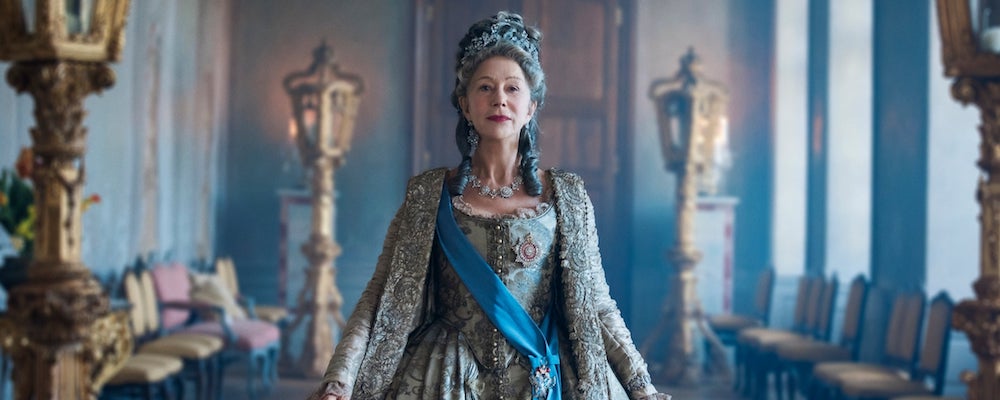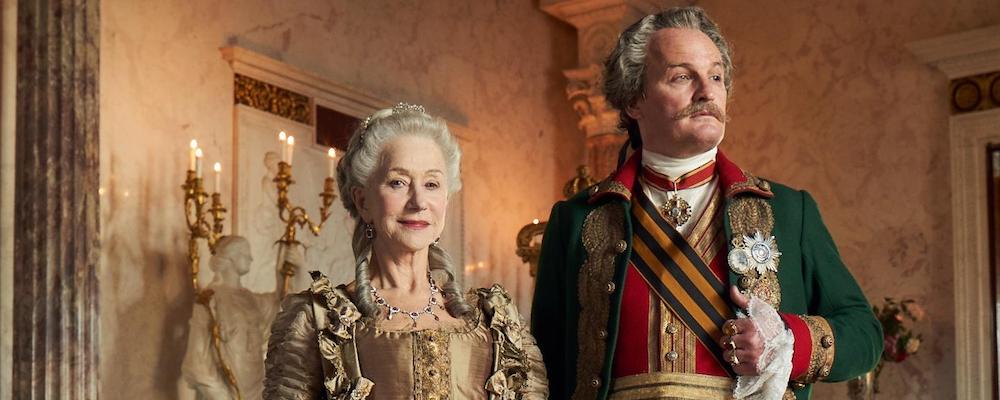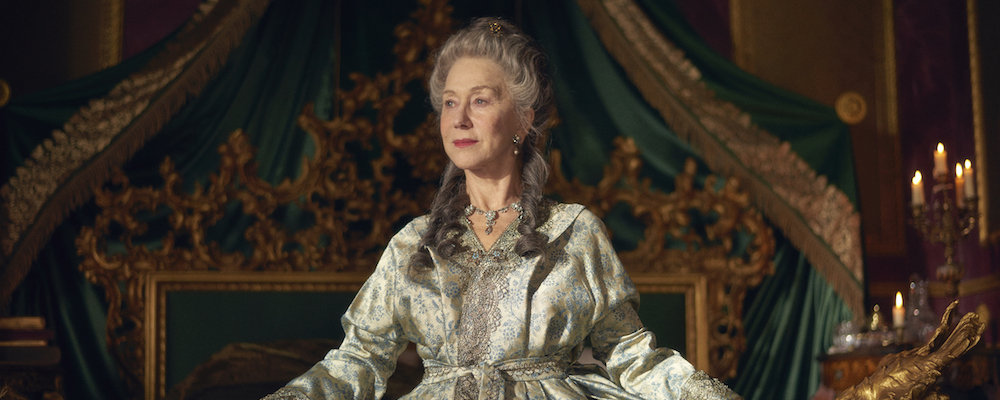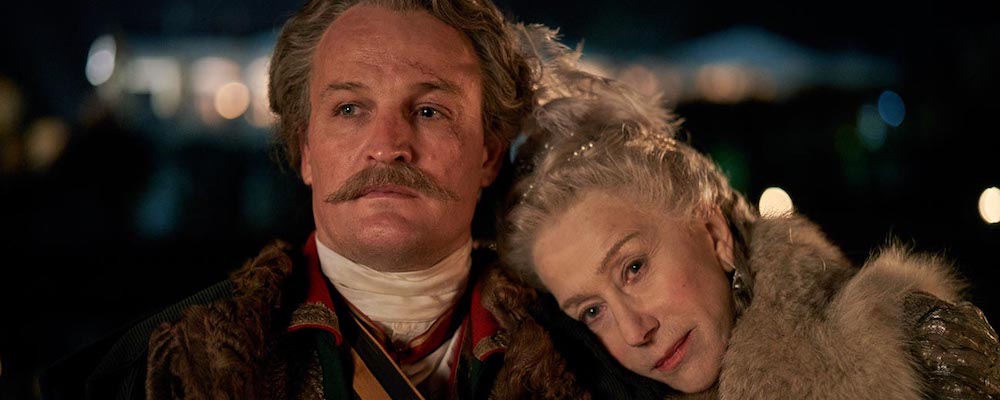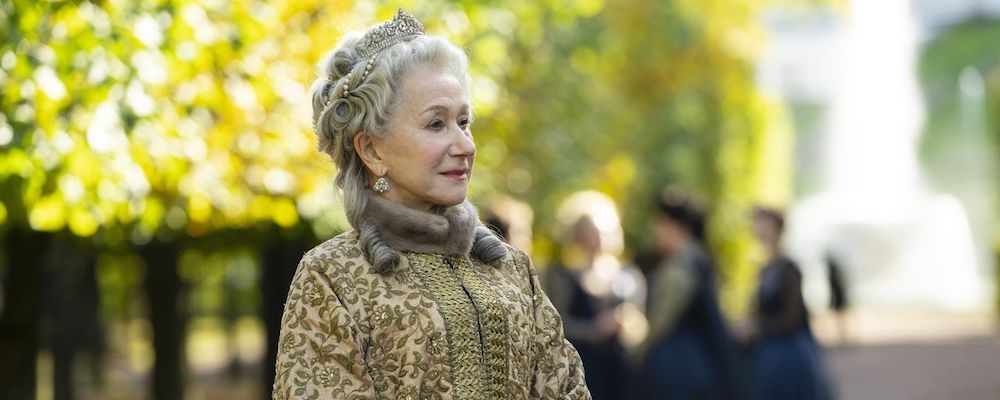Helen Mirren Reigns Again in HBO’s Lavish ‘Catherine the Great’
Alci Rengifo
HBO’s lavish limited series “Catherine the Great” understands that even great figures in history are ever so human, driven by feelings of longing and ambition. It’s a production of epic proportion, but it works so well because even its title character is scaled down to a relatable level. Of course it may be difficult to relate to the empress of Russia, but as played by Helen Mirren, who won an Academy Award for her performance as Queen Elizabeth II in “The Queen,” Catherine the Great becomes a figure of both fierce intelligence and hidden fears. She must survive in a world still dominated by men, while finding friendship and love in the only man who seems to understand her.
Set in the 1760s, the series focuses on a Catherine who is already slightly past middle age. She has absolute power but the Russian court is a nest of intrigue. Everyone is aware Catherine ascended to the throne by overthrowing her late husband Peter III. But for now she has the loyalty of the army, even as her own son, Prince Paul (Joseph Quinn), seems to have designs on the seat of power. Then into court comes Lt. Grigory Potemkin (Jason Clarke). Larger than life, boisterous and both lover and fighter, Potemkin captures Catherine’s attention in a palace where life can feel tedious. What begins as friendly flirtation turns into something deeper. Meanwhile Catherine must deal with the hassles of rule, such as peasant rebellions and brewing conflict with the Ottoman Empire. As Potemkin moves closer into her circle he tries to encourage her to propel Russia forward as a great power, with a particular focus in taking over Crimea. Swept by the tides of history, it soon becomes difficult for the empress to find love when there is a whole country to rule and scheming court to watch out for.
Directed by Philip Martin, and written by Nigel Williams who wrote the 2005 miniseries “Elizabeth I” that won Mirren an Emmy and Golden Globe, this take on the life of Catherine the Great features the kind of visual elegance typical of British productions, but it never allows its scale to overtake the personal dimensions. There are few battle scenes, most are relegated to Potemkin walking down a field of wounded Turks, slicing his way through any lingering enemies, while any other references to warfare take place in Catherine’s meeting halls as she surveys maps and discusses tactics with her generals. Instead “Catherine the Great” sets the very mood of living within the vast halls of a Tsarist palace where privacy is rare and who you sleep with has vast political implications. There is a loneliness to vast power captured in the writing. Catherine loves men and takes several lovers, but she longs for actual affection, which is hard to find when most men see her as an icon who can then pass power on to them. At the beginning of the series the monarch is openly bored with longtime partner Grigory Orlov (Richard Roxburgh), who immediately sees Potemkin as a threat. Yet he never expresses his worries out of actual devotion for Catherine, but out of fear that he’ll be reduced to a nobody. Catherine would rather ponder abolishing serfdom or ending slavery in the empire than be near Orlov in bed.
When Potemkin enters Catherine’s life the series takes on a more intimate tone, using the story of the two lovers as an exploration of bonds that form closely in complicated situations. Sure the series could have been more about the grander historical panorama or the intricacies of Catherine’s policies, but drama appeals primarily to moods and larger themes. Anyone who wants a full education on this period of Russian history would do better in getting a book. Potemkin and Catherine must balance their affections with their more public roles. A known womanizer Potemkin finds in the empress a stability he’s never known, yet it’s hard for him to adjust and he desires adventure. When war breaks out with Turkey he rushes to the front, and it is he who pushes Catherine to take Crimea so Russia may build an even more powerful naval force. Jason Clarke plays Potemkin as a romantic semi-swashbuckler, too down to earth to take on the airs of an aristocrat, even fixing a loose boot while following Catherine to court. When Orlov and a crony beat up Potemkin and even throw him out a window he gets back up, not even bruises and broken bones will stop this guy. Catherine will later tell him at a costume ball to be patient, vengeance will take time.
Mirren and Clarke play their roles with a particularly special closeness. They don’t behave like stiff historical characters, but like a real relationship that develops out of genuine attraction and friendship. These two excellent actors bring real passion to their love scenes and a loveable attitude to moments where they banter and argue. Even if the plot flirts with melodrama, there’s a welcome realism. Being a historical epic, there are still those moments of visceral drama. Daughters in law will die during childbirth, Potemkin will go off to war and Catherine will despair and hearing nothing for weeks, and there are always coup plotters in the palace who see her as illegitimate. Catherine the Great becomes a kind of proto-feminist figure in this series, her strength fueled by surviving in a world dominated by men who feel power is owed to them. She warns Paul that if he ponders an uprising he will fail, she has 50 years of experience in taking on a world “that didn’t want me.”
“Catherine the Great” is an engaging fix for those who love period pieces, but as pure drama it’s also a well-written portrait of a relationship with all of its intricacies and stresses. These characters are larger than life, but their feelings and fears are relatable to anyone. It’s just as hard juggling three jobs and love as it was for Catherine to balance love with Potemkin with running an emerging empire. The icon suddenly feels closer to us than we would have thought.
“Catherine the Great” premieres Oct. 21 and airs Mondays at 10 p.m. ET on HBO.

